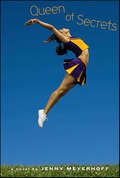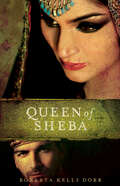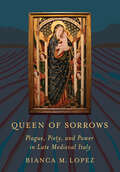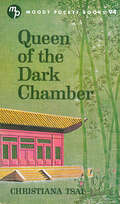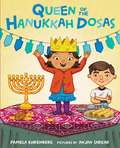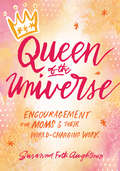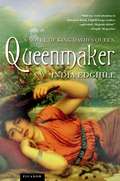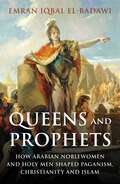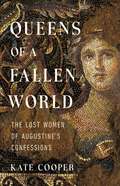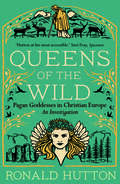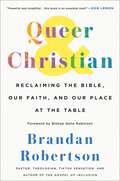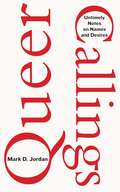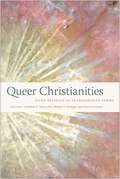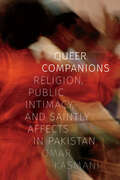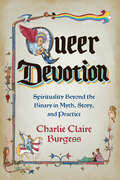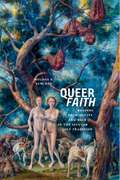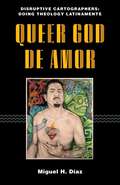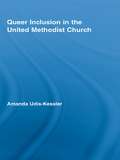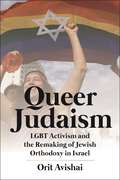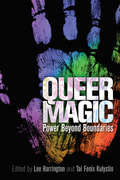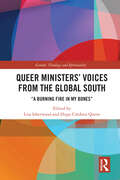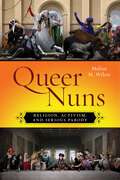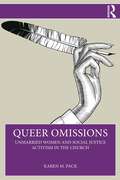- Table View
- List View
Queen of Secrets: A Novel
by Jenny MeyerhoffThis year, Essie Green's life is going to be different. She's made the cheerleading squad and caught the eye of the captain of the football team. However, she didn't expect her estranged cousin to join the football team. Micah is instantly branded a freak for praying during games, and Essie doesn't want anything to do with him. As the football team's teasing of Micah shifts into hazing, Essie is forced to make a choice between the boy she might love and the cousin she barely knows.
Queen of Sheba
by Roberta Kells DorrThis stirring account of the Queen of Sheba's search for truth and love paints a captivating portrait of a woman struggling with her passions and responsibilities in the ancient Middle East.. Dorr tells of a beautiful, intelligent, and independent queen who constantly battles the priests and high lords of her kingdom who resent being ruled by a woman. Bilqis, the queen of Sheba, is a woman as modern as her story is ancient.Disillusioned by her own religion, under pressure to marry but finding no suitor who meets her own high standards, and disturbed by the new fleet of ships on her trade routes, Bilqis travels to Israel to meet the legendary Hebrew king and divert a needless and costly war. How Solomon finally wins her, and how this beautiful queen resolves the conflicts among herself, her old religion, and the intrigues of her kinsmen, make The Queen of Sheba an exciting, bold novel of love and faith.
Queen of Sheba
by Roberta Kells DorrThis stirring account of the Queen of Sheba's search for truth and love paints a captivating portrait of a woman struggling with her passions and responsibilities in the ancient Middle East.. Dorr tells of a beautiful, intelligent, and independent queen who constantly battles the priests and high lords of her kingdom who resent being ruled by a woman. Bilqis, the queen of Sheba, is a woman as modern as her story is ancient.Disillusioned by her own religion, under pressure to marry but finding no suitor who meets her own high standards, and disturbed by the new fleet of ships on her trade routes, Bilqis travels to Israel to meet the legendary Hebrew king and divert a needless and costly war. How Solomon finally wins her, and how this beautiful queen resolves the conflicts among herself, her old religion, and the intrigues of her kinsmen, make The Queen of Sheba an exciting, bold novel of love and faith.
Queen of Sorrows: Plague, Piety, and Power in Late Medieval Italy (Medieval Societies, Religions, and Cultures)
by Bianca M. LopezQueen of Sorrows takes an original approach to both late-medieval Italian history and the history of Christianity, using quantitative and qualitative analyses of a remarkable archive of 1,904 testaments to determine patterns in giving to the Virgin of Loreto shrine in the late fourteenth and early fifteenth centuries. Bianca M. Lopez argues that in central Italy, as elsewhere, the cult of the Virgin Mary gained new prominence at this time of unprecedented mortality. Individuals gave to Santa Maria di Loreto, which houses the structure in which Mary is believed to have lived, as an expression of their grief in the hope of strengthening family lineages beyond death and to care for loved ones believed to be languishing in purgatory.Lopez establishes statistical correlations between different social groups and their donations to Loreto over time, uncovering informative new historical patterns such as the prominence of widow and migrant donors in the notarial record. The testaments also provide a social history of Recanati, revealing how its denizens venerated Mary as a saint with unrivaled spiritual power and uniquely sympathetic to grief, having lost her own son, Jesus. In the fourteenth century, plague survivors transformed their anguish into Marian devotion. The devastation of the plague brought the Virgin out of noble courts and monasteries and onto city streets. As Queen of Sorrows details, however, the popularity and growing wealth of Loreto's Marian shrine attracted the attention of the papacy and peninsular seigneurial lords, who eventually brought Santa Maria di Loreto under the control of the Church.
Queen of the Dark Chamber
by Christiana TsaiIt is a time of heavy persecution in China. Christiana Tsai becomes a follower of Christ. An autobiography, Queen of the Dark Chamber exposes Christiana&’s severe suffering because of her conversion. Through her, however, the light and life of the gospel and the glory of Christ is revealed. Step into her life and taste the bitterness of sin around her and the brilliant sweetness of Christ&’s light in the midst of trial.
Queen of the Dark Chamber
by Christiana TsaiIt is a time of heavy persecution in China. Christiana Tsai becomes a follower of Christ. An autobiography, Queen of the Dark Chamber exposes Christiana&’s severe suffering because of her conversion. Through her, however, the light and life of the gospel and the glory of Christ is revealed. Step into her life and taste the bitterness of sin around her and the brilliant sweetness of Christ&’s light in the midst of trial.
Queen of the Hanukkah Dosas
by Pamela EhrenbergIn this sweet and humorous picture book, Queen of the Hanukkah Dosas, a multi-cultural family (Mom's Indian; Dad's Jewish) celebrate Hanukkah while incorporating traditional Indian food. Instead of latkes, this family celebrates Hanukkah with tasty Indian dosas. To her brother's chagrin, little Sadie won't stop climbing on everything both at home and at the Indian grocery store, even while preparing the dosas. As the family puts the finishing touches on their holiday preparations, they accidentally get locked out of the house. Sadie and her climbing skills just may be exactly what is needed to save the day.
Queen of the Universe: Encouragement for Moms and Their World-Changing Work
by Susanna Foth AughtmonAs a mom, you rule your family's universe. Everyone looks to you to know the answers, create the atmosphere, and make it happen -- whatever it is. Who you are has a huge impact on who your children become. And though you may not always feel it, you are the best possible queen of their universe. God created you exclusively for that position. These fifty-two devotions will inspire and encourage you to understand and appreciate the difference you make in the lives of your families.
Queenmaker: A Novel of King David's Queen
by India EdghillFor over forty years, Michal lived and reigned in David's court. She was the beautiful and proud daughter of King Saul and the prize David would risk his kingdom to win. Behind the palace doors, beneath the burning sun of the desert, or fleeing from Absalom's warriors, Michal was at the center of court intrigues. Queenmaker introduces in unforgettable detail the characters of one of the greatest periods in Biblical history-their public deeds and private thoughts-and gives us the court of the kings as only a woman could see it.
Queens and Prophets: How Arabian Noblewomen and Holy Men Shaped Paganism, Christianity and Islam
by Emran Iqbal El-Badawi&‘A genuinely paradigm-shifting work by one of the most exciting and innovative scholars in the field... compelling and powerful...&’ Reza Aslan Arab noblewomen of late antiquity were instrumental in shaping the history of the world. Between Rome&’s intervention in the Arabian Peninsula and the Arab conquests, they ruled independently, conducting trade and making war. Their power was celebrated as queen, priestess and goddess. With time some even delegated authority to the most important holy men of their age, influencing Arabian paganism, Christianity and Islam. Empress Zenobia and Queen Mavia supported bishops Paul of Samosata and Moses of Sinai. Paul was declared a heretic by the Roman church, while Moses began the process of mass Arab conversion. The teachings of these men survived under their queens, setting in motion seismic debates that fractured the early churches and laid the groundwork for the rise of Islam. In sixth-century Mecca, Lady Khadijah used her wealth and political influence to employ a younger man then marry him against the wishes of dissenting noblemen. Her husband, whose religious and political career she influenced, was the Prophet Muhammad. A landmark exploration of the legacy of female power in late antique Arabia, Queens and Prophets is a corrective that is long overdue.
Queens of a Fallen World: The Lost Women of Augustine's Confessions
by Kate CooperFINALIST: THE CUNDILL HISTORY PRIZE 2023The vibrant and surprising lives of the women in Augustine's Confessions While many know of Saint Augustine and his Confessions, few are aware of how his life and thought were influenced by women.Queens of a Fallen World tells a story of betrayal, love, and ambition in the ancient world as seen through a woman's eyes. Historian Kate Cooper introduces us to four women whose hopes and plans collided in Augustine's early adulthood: his mother, Monnica of Thagaste; his lover; his fiancée; and Justina, the troubled empress of ancient Rome. Drawing upon their depictions in the Confessions, Cooper skilfully reconstructs their lives against the backdrop of their fourth-century society. Though they came from different walks of life, each found her own way of prevailing in a world ruled by men. A refreshingly complex and compelling portrait of Augustine, Queens of a Fallen World is the riveting story of four remarkable women who set him on course to change history.
Queens of the Wild: Pagan Goddesses in Christian Europe: An Investigation
by Ronald HuttonA concise history of the goddess-like figures who evade both Christian and pagan traditions, from the medieval period to the present day In this riveting account, renowned scholar Ronald Hutton explores the history of deity-like figures in Christian Europe. Drawing on anthropology, archaeology, literature, and history, Hutton shows how hags, witches, the Fairy Queen, and the Green Man all came to be, and how they changed over the centuries. Looking closely at four main figures—Mother Earth, the Fairy Queen, the Mistress of the Night, and the Old Woman of Gaelic tradition—Hutton challenges decades of debate around the female figures who have long been thought versions of pre-Christian goddesses. He makes the compelling case that these goddess figures found in the European imagination did not descend from the pre-Christian ancient world, yet have nothing Christian about them. It was in fact nineteenth-century scholars who attempted to establish the narrative of pagan survival that persists today.
Queer & Christian: Reclaiming the Bible, Our Faith, and Our Place at the Table
by Brandan RobertsonCelebrate queer faith and take your rightful place at God’s table with Brandan Robertson, the “TikTok Pastor,” Biblical scholar, and social activist For too long, the Bible has been weaponized to exclude LGBTQ+ individuals, despite Jesus’ radical message of inclusion. In Queer & Christian, Brandan Robertson envisions a faith where all are unequivocally embraced.Ostracized at school, Brandan thought he had finally found his community when he joined the local church. But he soon realized that they were as intolerant as his peers at school had been—if not more so. After agonizing years of repressing his true identity, he discovered that God’s table had always had a place for him. Jesus’ love knows no bounds, embracing everyone unconditionally. Queer & Christian is a joyful celebration of queer faith and an unyielding reclamation of the Bible. Dive into pages that offer: -Compelling, evidence-based counterarguments to the “clobber verses” often used to condemn queerness-Celebrations of queer saints within the Bible—more numerous than you might believe!-Responses to commonly asked questions by queer folks and allies who’re feeling lost within the Christian faith Brandan Robertson stands as a beacon of love, hope, and unwavering support for anyone ready to reclaim their faith from the clutches of intolerance.
Queer Callings: Untimely Notes on Names and Desires
by Mark D. JordanCHOICE: OUTSTANDING ACADEMIC TITLEFINALIST, THE RANDY SHILTS AWARD FOR GAY NONFICTION, THE PUBLISHING TRIANGLE AWARDSA passionate exhortation to expand the ways we talk about human sex, sexuality, and gender.Twenty-five years ago, Mark D. Jordan published his landmark book on the invention and early history of the category “sodomy,” one that helped to decriminalize certain sexual acts in the United States and to remove the word sodomy from the updated version of a standard English translation of the Christian Bible. In Queer Callings, Jordan extends the same kind of illuminating critical analysis to present uses of “identity” with regard to sexual difference. While the stakes might not seem as high, he acknowledges, his newest history of sexuality is just as vital to a better present and future.Shaking up current conversations that focus on “identity language,” this essential new book seeks to restore queer languages of desire by inviting readers to consider how understandings of “sexual identity” have shifted—and continue to shift—over time. Queer Callings re-reads texts in various genres—literary and political, religious and autobiographical—that have been preoccupied with naming sex/gender diversity beyond a scheme of LGBTQ+ identities. Engaging a wide range of literary and critical works concerned with sex/gender self-understanding in relation to “spirituality,” Jordan takes up the writings of Oscar Wilde, Marcel Proust, Djuna Barnes, Samuel R. Delany, Audre Lorde, Geoff Mains, Eve Kosofsky Sedgwick, Gloria Anzaldúa, Maggie Nelson, and others.Before it’s possible to perceive sexual identities differently, Jordan argues, current habits for classifying them have to be disrupted. In this way, Queer Callings asks us to reach beyond identity language and invites us to re-perform a selection of alternate languages—some from before the invention of phrases like “sexual identity,” others more recent. Tracing a partial genealogy for “sexual identity” and allied phrases, Jordan reveals that the terms are newer than we might imagine. Many queer folk now counted as literary or political ancestors didn’t claim a sexual or gender identity: They didn’t know they were supposed to have one. Finally, Queer Callings joins the writers it has evoked to resist any remaining confidence that it’s possible to give neatly contained accounts of human desire. Reaching into the past to open our eyes to extraordinary opportunities in our present and future, Queer Callings is a generatively destabilizing and essential read.
Queer Christianities: Lived Religion in Transgressive Forms
by Kathleen T. Talvacchia, Michael F. Pettinger, and Mark LarrimoreQueerness and Christianity, often depicted as mutually exclusive, both challenge received notions of the good and the natural. Nowhere is this challenge more visible than in the identities, faiths, and communities that queer Christians have long been creating. As Christians they have staked a claim for a Christianity that is true to their self-understandings. How do queer-identified persons understand their religious lives? And in what ways do the lived experiences of queer Christians respond to traditions and reshape them in contemporary practice? Queer Christianities integrates the perspectives of queer theory, religious studies, and Christian theology into a lively conversation—both transgressive and traditional—about the fundamental questions surrounding the lives of queer Christians. The volume contributes to the emerging scholarly discussion on queer religious experiences as lived both within communities of Christian confession, as well as outside of these established communities.Organized around traditional Christian states of life—celibacy, matrimony, and what is here provocatively conceptualized as promiscuity—this work reflects the ways in which queer Christians continually reconstruct and multiply the forms these states of life take. Queer Christianities challenges received ideas about sexuality and religion, yet remains true to Christian self-understandings that are open to further enquiry and to further queerness.
Queer Companions: Religion, Public Intimacy, and Saintly Affects in Pakistan
by Omar KasmaniIn Queer Companions Omar Kasmani theorizes saintly intimacy and the construction of queer social relations at Pakistan’s most important site of Sufi pilgrimage. Conjoining queer theory and the anthropology of Islam, Kasmani outlines the felt and enfleshed ways in which saintly affections bind individuals, society, and the state in Pakistan through a public architecture of intimacy. Islamic saints become lovers and queer companions just as a religious universe is made valuable to critical and queer forms of thinking. Focusing on the lives of ascetics known as fakirs in Pakistan, Kasmani shows how the affective bonds with the place’s patron saint, a thirteenth-century antinomian mystic, foster unstraight modes of living in the present. In a national context where religious shrines are entangled in the state’s infrastructures of governance, coming close to saints further entails a drawing near to more-than-official histories and public forms of affect. Through various fakir life stories, Kasmani contends that this intimacy offers a form of queer world making with saints.
Queer Devotion: Spirituality Beyond the Binary in Myth, Story, and Practice
by Charlie Claire BurgessA liberating exploration of the queer divine in deities and figures of myth and legend that opens pathways for LGBTQIA+ people to revere the divinity within and create an affirming spiritual practice.Queer people have always existed and queerness has always been divine. Queer Devotion, by tarot teacher and deck creator Charlie Claire Burgess, reminds us of this by re-examining sacred stories through a queer and gender expansive lens. With exercises, reflection prompts, and ritual suggestions, readers can discover a deeper spiritual relationship with themselves and the divine and begin building an affirming personal practice of self-defined queer devotion.From gay Greek gods to genderfluid Norse ones, from transgender Catholic saints to queer Arthurian legends, Queer Devotion reveals that spirituality has always been far queerer than we&’ve been led to believe. In the beginning, the gods were queer—and they still are.
Queer Faith: Reading Promiscuity and Race in the Secular Love Tradition (Sexual Cultures #52)
by Melissa E. SanchezHonorable Mention, 2020 Aldo and Jeanne Scaglione Prize, given by the Modern Language AssociationUncovers the queer logics of premodern religious and secular textsPutting premodern theology and poetry in dialogue with contemporary theory and politics, Queer Faith reassess the commonplace view that a modern veneration of sexual monogamy and fidelity finds its roots in Protestant thought. What if this narrative of “history and tradition” suppresses the queerness of its own foundational texts? Queer Faith examines key works of the prehistory of monogamy—from Paul to Luther, Petrarch to Shakespeare—to show that writing assumed to promote fidelity in fact articulates the affordances of promiscuity, both in its sexual sense and in its larger designation of all that is impure and disorderly. At the same time, Melissa E. Sanchez resists casting promiscuity as the ethical, queer alternative to monogamy, tracing instead how ideals of sexual liberation are themselves attached to nascent racial and economic hierarchies. Because discourses of fidelity and freedom are also discourses on racial and sexual positionality, excavating the complex historical entanglement of faith, race, and eroticism is urgent to contemporary queer debates about normativity, agency, and relationality.Deliberately unfaithful to disciplinary norms and national boundaries, this book assembles new conceptual frameworks at the juncture of secular and religious thought, political and aesthetic form. It thereby enlarges the contexts, objects, and authorized genealogies of queer scholarship. Retracing a history that did not have to be, Sanchez recovers writing that inscribes radical queer insights at the premodern foundations of conservative and heteronormative culture.
Queer God de Amor (Disruptive Cartographers: Doing Theology Latinamente)
by Miguel H. DíazQueer God de Amor explores the mystery of God and the relationship between divine and human persons. It does so by turning to the sixteenth-century writings of John of the Cross on mystical union with God and the metaphor of sexual relationship that he uses to describe this union. Juan’s mystical theology, which highlights the notion of God as lover and God’s erotic-like relationship with human persons, provides a fitting source for rethinking the Christian doctrine of God, in John’s own words, as “un no sé qué,” “an I know not what.”In critical conversations with contemporary queer theologies, it retrieves from John a preferential option for human sexuality as an experience in daily life that is rich with possibilities for re-sourcing and imagining the Christian doctrine of God. Consistent with other liberating perspectives, it outs God from heteronormative closets and restores human sexuality as a resource for theology. This outing of divine queerness—that is, the ineffability of divine life—helps to align reflections on the mystery of God with the faith experiences of queer Catholics. By engaging Juan de la Cruz through queer Latinx eyes, Miguel Díaz continues the objective of this series to disrupt the cartography of theology latinamente.
Queer Inclusion in the United Methodist Church (New Approaches in Sociology)
by Amanda Udis-KesslerThe United Methodist Church has been in conflict over lesbian/gay/bisexual/transgender inclusion issues since 1972. That year, in response to the gay liberation and gay rights movements, wording was added to the UMC Book of Discipline (the compilation of denominational policies and doctrines) characterizing homosexuality as "incompatible with Christian teaching." Since then, United Methodist ministers have been forbidden to perform same-sex commitment ceremonies (and United Methodist churches forbidden to host them), a rule has been passed that non-heterosexual United Methodist ministers must be celibate, and the UMC has forbidden the funding of any program or organization "supporting" homosexuality. These policies have been met with significant resistance by those fighting for GLBT inclusion. In this groundbreaking book, Udis-Kessler examines this struggle, analyzing both sides of this divisive debate among one of the most prominent religious organizations in the United States.
Queer Judaism: LGBT Activism and the Remaking of Jewish Orthodoxy in Israel
by Orit AvishaiOffers a compelling look at how Orthodox Jewish LGBT persons in Israel became more accepted in their communities.Until fairly recently, Orthodox people in Israel could not imagine embracing their LGBT sexual or gender identity and staying within the Orthodox fold. But within the span of about a decade and a half, Orthodox LGBT people have forged social circles and communities and become much more visible. This has been a remarkable shift in a relatively short time span. Queer Judaism offers the compelling story of how Jewish LGBT persons in Israel created an effective social movement.Drawing on more than 120 interviews, Orit Avishai illustrates how LGBT Jews accomplished this radical change. She makes the case that it has taken multiple approaches to achieve recognition within the community, ranging from political activism to more personal interactions with religious leaders and community members, to simply creating spaces to go about their everyday lives. Orthodox LGBT Jews have drawn from their lived experiences as well as Jewish traditions, symbols, and mythologies to build this movement, motivated to embrace their sexual identity not in spite of, but rather because of, their commitment to Jewish scripture, tradition, and way of life. Unique and timely, Queer Judaism challenges popular conceptions of how LGBT people interact and identify with conservative communities of faith.
Queer Magic: Power Beyond Boundaries
by Lee Harrington Tai Fenix KulystinIn a wide variety of pagan paths, many forms of modern magic and mystery hold an expectation that all parties are heterosexual, cisgender, and, in many cases, white. In Queer Magic: Power Beyond Boundaries, Lee Harrington and Tai Fenix Kulystin bring together a diverse and passionate collection of authors and artists who break out beyond that belief and explore how being LGBT+ is not just acceptable when exploring magic, but powerful. Using the diverse tools of queer activism, education, and storytelling, through academic essays and first-person narratives to comics and poster-style art, this intersectional group exposes a world beyond what so many magical practitioners have presumed is "normal." The reality is that magic, whether in Wicca or Vodou, Heathenry or Polytheism, has been fueled by people and systems beyond the binary for millennia. For many within, magic and queerness are not separate, but deeply entwined pieces of identity, worldview, and culture experienced together, always. Drag queen magic, Inclusive witchcraft, and magic for healing and survival. Gender transition in Rome, possession practices, and DIY divination. Social justice, queer black tantra, and polarity beyond gender. Honoring ancestors, fluidity of consciousness, and reimagining the Great Rite. Queer sex magic, power sigils, deities that reflect diversity... and more. Whether you identify as lesbian, gay, bisexual, asexual, transgender, agender, genderqueer, or some other queer orientation, or you are curious about tools to access magic beyond what is often discussed, this book is for you. Each piece is a unique and passionate chance to look into your own relationship with magic, break out of the tales of what your practice "should" look like, and expand your awareness into the queer magic as well as your own power beyond boundaries.
Queer Ministers’ Voices from the Global South: "A Burning Fire in My Bones" (Gender, Theology and Spirituality)
by Hugo Córdova Quero Lisa IsherwoodThis book brings together the narratives of diverse ministers from the Global South in order to show that queer theologies are impacting many parts of the world and queer lives are molding and enriching Christian ministry. Across Asia, Africa, and Latin America, we are witnessing the emergence of queer faith-based communities in very different contexts and with very different histories. The perspectives included in the book form a tapestry that honors diversity among the Global South’s queer communities and ministries. They demonstrate the various ways in which queer ministry challenges and changes theological understanding as well as religious practice. Each chapter highlights issues pertaining to liturgy, sacraments, pastoral rites, and the personal faith journey that each minister underwent to foster pastoral queer theologies. Contributors focus on their understanding of the relationship between faith and sexuality, how rituals relate to the daily lives of queer believers, and the struggles they face within the political structures of religious institutions. The narratives highlight some of the challenges and mechanisms deployed to cope with ingrained LGBTIQ+ phobia. They also evidence how communities enact interreligious and multi-religious dialog and rituals while honoring faith and activism, and how prophetic ministries counter oppressive discourses and colonial performativities. This is a valuable resource for academics and religious leaders interested in the study of queer theologies, Asian, African, and Latin American Christianity, as well as ecclesiastical and liturgical issues.
Queer Nuns: Religion, Activism, and Serious Parody (Sexual Cultures #33)
by Melissa M. WilcoxAn engaging look into the Sisters of Perpetual Indulgence, queer activists devoted to social justice The Sisters of Perpetual Indulgence make up an unlikely order of nuns. Self-described as “twenty-first century queer nuns,” the Sisters began in 1979 when three bored gay men donned retired Roman Catholic nuns’ habits and went for a stroll through San Francisco’s gay Castro district. The stunned and delighted responses they received prompted these already-seasoned activists to consider whether the habits might have some use in social justice work, and within a year they had constituted the new order. Today, with more than 83 houses on four different continents, the Sisters offer health outreach, support, and, at times, protest on behalf of queer communities. In Queer Nuns, Melissa M. Wilcox offers new insights into the role the Sisters play across queer culture and the religious landscape. The Sisters both spoof nuns and argue quite seriously that they are nuns, adopting an innovative approach the author refers to as serious parody. Like any performance, serious parody can either challenge or reinforce existing power dynamics, and it often accomplishes both simultaneously. The book demonstrates that, through the use of this strategy, the Sisters are able to offer an effective, flexible, and noteworthy approach to community-based activism. Serious parody ultimately has broader applications beyond its use by the Sisters. Wilcox argues that serious parody offers potential uses and challenges in the efforts of activist groups to work within communities that are opposed and oppressed by culturally significant traditions and organizations – as is the case with queer communities and the Roman Catholic Church. This book opens the door to a new world of religion and social activism, one which could be adapted to a range of political movements, individual inclinations, and community settings.
Queer Omissions: Unmarried Women and Social Justice Activism in the Church
by Karen M. PackProtestant Christian historiography has persistently erased unmarried, childless women from the story of faith in Australia. When women are mentioned, they are judged according to a heteronormative, maternalist framework built upon the ideology of separate spheres. This paradigm creates a lopsided picture, whereby women are celebrated for their social and moral influence, but are absent from rational, intellectual discourse. This book asks the question, why have unmarried women who devoted themselves to social justice activism motivated by their Christian faith been erased from the pages of Australian religious histories? It does this through biographies of two unmarried women, each engaged in very different work aimed at creating a more just and equitable Australia.Queer Omissions uses biographical case studies of two unmarried, childless women, Frances Levvy (1831–1924) and Constance Duncan (1896–1970), to critique the writing of Protestant religious histories in Australia, asking why those outside a heteronormative framework have been relegated to the margins. Motivated by their faith, Duncan and Levvy engaged in social justice activism that left an indelible mark on Australian society. Yet, they remain absent from the histories of their own faith communities. Queer Omissions seeks to tell a bigger story, of women who chafed against their contracted sphere yet – motivated by their faith – impacted their world for good. In doing so, it uniquely expands the categories of those who see themselves in the story, finding hope in the process.This book will be of great interest to scholars of religion, gender, and sexuality, as well as people of faith trying to understand and reclaim their place in the story.
